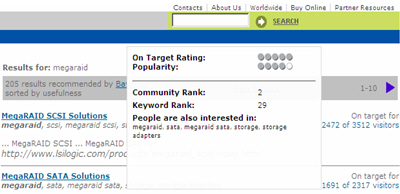Baynote applies wisdom of communities to search

Most search engines apply behavioral intelligence--applying clickstream data, such as link structure, to improve search--but Baynote is taking it a step further. The company, founded in November 2004 and employing about 20 people, is mining user behavior on Web pages--what CEO Jack Jia calls the "wisdom of the community"--for improving enterprise search results.
It could also be called a form of "social search," which is how Yahoo describes its MyWeb service, which allows user to tag, annotate and save Web pages and share them with others in their personal network. Eurekster's social search engine learns from the clickstream behavior on search result pages, refines search queries and re-ranks results drawn from general search indexes that reflect the "wisdom" of llike-minded users of a publisher’s Web site.
According to Jia, Baynote embeds SGML technology in Web site template pages, and implicitly observes what people do with the content, generating up to millions of observation signals. "When people find something useful, they have set of behavioral clues that are detectable through our 'observer,' which are sent to our hosted server," Jia said. "The server's affinity engine functions similar to the human brain, filtering out noise and regrouping data into peers, such as products, jobs or investments, and within each group creates subgroups and usage information the can change navigation and search results."

Baynote provides metadata based on its behavioral search technology
Among the dozen observable behaviors Baynote tracks on Web pages are highlighting, scrolling, cut and paste operations, bookmarking, printing and entry points and exit destinations, Jia said. The science in Baynote's service come out of emergent behavior studies.
According to a white paper from the company:
When properly aligned with one another, groups of individuals can learn and adapt together to achieve an intelligence that goes far beyond even the sum of the parts. Known as , this phenomenon is perhaps best exemplified by a colony of ants. An individual ant follows very simple rules—randomly looking for food and dropping pheromone trails on the way home from a find. But an ant colony is an organism that exhibits incredible efficiency, adaptability, and robustness in the search for food—reaching far beyond the collected individual abilities of it components.
In many ways, finding useful content on the web is not that different from ants looking for food. If properly aligned, the individual behaviors and experiences of information seekers can be combined to create an emergent ability for locating information and resources that goes far beyond the capabilities of the individuals. What Baynote does is provide the underlying mechanism that enables the individual information seekers to properly align with one another and allow their collective intelligence to emerge. Much like the ant colony, the individual visitor need not have any intention or awareness of contributing to the whole but at the same time can take full advantage of the greater intelligence of which she is a part.
By providing more targeted results with fewer clicks via its technology, Baynote's customers should see higher conversion rates, turning site visitors into registered users, customers, or more active users who download presentations, white papers and other materials. Jia claims that customers see as much as 2000 percent improvement over traditional enterprise search engines, and Baynote works on top of whatever search technology customers use, such as Automony/Verity, FAST, IBM and Google.
Baynote's guided navigation can place the filtered content for popular queries on pages. Content ten clicks away can become one click away, and the content placement dynamically changes based on user behaviors, Jia said. Baynote also aggregates content related to a query that the 'community' finds useful, and generates reports on trends, site forensics, content gaps and other elements. In addition, Baynote is using the technology for people who use AdWords or other advertising services.
Baynote customers to date including LSI Logic, Interwoven (Jia's was formerly CTO of the company) , and SEMI. Subscription pricing for the hosted service starts at $950 per Web site, for about 500 pages and 10,000 unique users per month, and $95 monthly for small-to-medium businesses, according to Mike Svatek, director of marketing & product management. A set up fee of $5,000 to $10,000 is required, depending on the complexity of the solution.